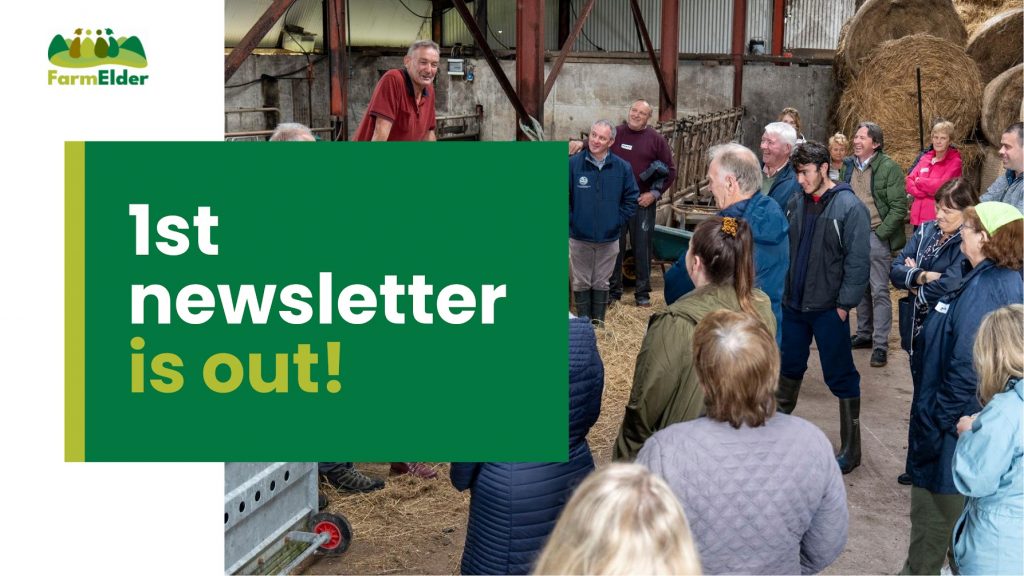FarmElder beginnings
The idea of exploring social farming opportunities for elderly people came about during the work of the Erasmus + funded FARCURA project. During our work on that project, we began to see how social farming could meet some of the core needs of our growing population of elderly people. Some of the needs we identified in our preliminary research were:
- Europe’s population is ageing rapidly;
- the current care home/nursing home models do not meet the needs of many elderly people;
- there is a need to develop meaningful activities to facilitate active ageing;
- a lack of intergenerational connection means that elderly people are not able to contribute fully to society.
The purpose of our FarmElder project is to demonstrate how social farming can meet these needs. Our project partners from Ireland, Portugal, Germany, Slovenia and Belgium will work together to examine the issues facing elderly people and study social farming interventions in their countries that are emerging to address these needs. The project will produce 14 case studies, as well as reports on the challenges facing elderly people in each of the participating countries
We also have a unique FarmElder stories element to the project. Here we highlight some of the most inspiring case studies on social farming for the elderly through a series of short films.
Reports
Our four national reports and the European report, paint a picture of the demographic challenge facing Europe over the next 5 years. They are complemented by our summary report, which gives an overall picture, while the individual reports go into more detail.
Some of the key findings in the reports are:
- According to Eurostat, the proportion of older people (over 65) could reach almost 30% of the total population in the European Union by 2050, compared to 19% in 2018;
- The main challenges faced by older people are physical and mental health, the availability of adequate health services, poverty, social isolation and the provision of adequate and appropriate care;
- Issues with health and social marginalisation such as loneliness, social isolation, social exclusion, lack of engagement, and low levels of physical activity are recognised disease and mortality risk factors in older people. Social farming provides therapeutic activities that can address these risks and greatly improve quality of life, social relationships, activity participation, and physical activity.
Case studies
Along with the reports, 14 case studies have been developed which give a fascinating insight into the creative models being developed to adapt social farming to the needs of the elderly. These models include;
- A farm in Germany that provides residential kindergarten programs and also day visits for elderly people with dementia and their families.
- An intergenerational day-use project on a social farm in rural Slovenia that aims to allow older people to lead a meaningful life, thereby meeting their care and activity needs and enabling them to live at home for as long as possible.
- A village in Portugal whose elderly population have been supported to continue living there through an innovative mixture of volunteer engagement, community supports and social farming.
- Elderly farmers in Ireland who enhance their social connectivity by offering social farming places on their working farms.
Read the case studies here
FarmElder Stories
We are very excited about our FarmElder stories initiative. Mosaic, one of our Slovenia partners, are making a series of short videos to highlight some of the inspiring case studies we found during our research. The videos will capture the innovative ways in which some partner countries are using social farming to address the needs of the elderly.
Project Partners
The FarmElder project partners come from Ireland, Slovenia, Germany, Portugal and Belgium. Most of the partners have experience in some aspect of social farming and all have a keen interest in seeing this exciting form of social activity become more widely available in their countries and in the European Union as a whole. Our partners are:
- Technological University of the Shannon (TUS) – an institute of higher education in Ireland.
- Biotechnical Centre Naklo from Slovenia – an adult education and research unit.
- Hof und Leben GmbH (translating as Farm and Life) – an independent SME focusing on business consulting for family farms, based in Germany.
- Hochschule für nachhaltige Entwicklung Eberswalde (translating as University for Sustainable Development) – a university of applied sciences in Germany.
- European Landowners Organisation – in Belgium represents the interests of landowners, forest managers and rural entrepreneurs at the European political level.
- Mozaic Association – actively involved in the social inclusion of vulnerable social groups in the rural region of Pomurje, Slovenia.
- South Kerry Development Partnership Ltd – an experienced rural development organisation that runs a social farming project from its base in the south of Ireland.
- ADRIMAG – a non-profit organisation whose aim is to promote local development and provide opportunities to enhance the quality of life for the people of 7 municipalities in Portugal.
So, what’s next?
Based on the findings from the reports and case studies, the project partners are working on
a series of modules to make learning content on social farming with elderly people available
online.
Follow us!
Keep track of what’s going on by visiting our website or following us on Twitter.


